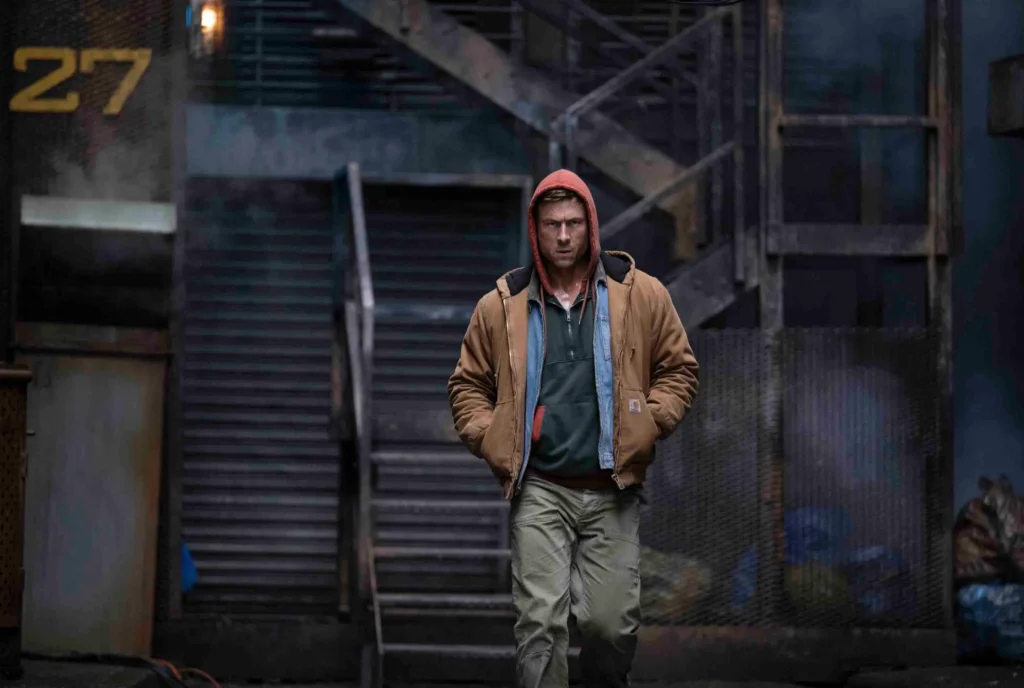When Edgar Wright took on The Running Man, he promised something more faithful to Stephen King’s original novel than the neon-slick 1987 Schwarzenegger version. The result is a sharply cut, visually restless, and surprisingly political action film that places Glen Powell at the center of a televised nightmare designed for our age of streaming spectacle.
respawn
In Wright’s adaptation, the year is 2025, and America has become an economy of desperation. The poor audition to die on television while the wealthy gamble on their survival. Ben Richards (Glen Powell), a laid-off worker with a sick daughter, volunteers for “The Running Man” — a state-sponsored game show in which fugitives are hunted for entertainment. Unlike the 1987 version, Wright’s world spills beyond a single arena: it’s highways, warehouses, hidden resistance cells, and endless digital feeds.
Powell’s Richards is not the muscle-bound rebel we remember; he’s lean, pragmatic, and more haunted than heroic. His mantra — “no war but class war” — doesn’t come as a slogan but as exhausted defiance. He’s less an action star than a survivor trying to make sense of the rules while the camera never stops rolling.
flow
Wright directs with his usual speed and precision. Cuts sync with breath and footstep, drones chase like mechanical vultures, and advertisements flash across the screen mid-chase. The editing owes more to Baby Driver than Hot Fuzz — all rhythm and propulsion — but the humor is sparse. This is Wright at his angriest.
Every frame suggests complicity: the bright studio lights, the smirking host (Colman Domingo, terrifyingly charismatic), the cheering crowd that doesn’t realize it’s watching itself. The film’s palette moves from sterile neon to soot and fire, tracking Richards’s path from entertainment pawn to class agitator.
View this post on Instagram
the perform
Glen Powell carries the film with a mixture of weariness and willpower. He moves like a man burning fuel he doesn’t have, and his calmness under pressure recalls classic noir heroes. When he finally turns on the cameras — literally, in the climax — the rage feels earned. Josh Brolin plays the show’s producer, a smooth architect of cruelty; and Lee Pace, one of the elite “hunters,” gives menace a human face.
Powell’s chemistry with the underground rebels gives the story a beating heart. Their dialogues, filmed in dim warehouses, echo King’s cynicism: the belief that revolution can itself become another televised commodity.
style
The Running Man has always been about the monetization of suffering. Wright sharpens that edge. His version replaces analog TV with viral streams, data analytics, and betting apps that turn human chase into content. The audience votes, comments, trades stocks of death. When Richards shouts, “Turn the cameras off,” the command feels impossible — the cameras are everywhere, including in the audience’s hands.
Beneath the explosions lies a thread of fatalism: what if resistance itself feeds the system? The film ends ambiguously, neither victorious nor defeated. Wright’s closing shot—Richards walking away as countless screens replay his rebellion—feels like a warning: every revolution becomes another broadcast.
show
The film’s energy is undeniable. The action is choreographed with Wright’s meticulous eye for motion; the pacing rarely drags. But its moral clarity sometimes blurs. The satire hits hard early, then softens under the weight of spectacle. The final act substitutes explosions for interrogation, though its intent remains pointed: keep your anger, but direct it upward, not sideways.
What distinguishes Wright’s version is tone — not campy, not nihilistic, but furious. It’s a rare Hollywood film that sends viewers home angry at the right things.
fin
The Running Man (2025) is both a chase film and a mirror. It entertains as it indicts, dares the audience to question what they watch, and repositions Stephen King’s pulp dystopia within a 21st-century economy of clicks and cruelty. Powell delivers the best work of his career, and Wright proves that spectacle can still carry a conscience — even when drenched in blood and light.
In a time when so much cinema aims to soothe, The Running Man wants to agitate. It succeeds.
No comments yet.








